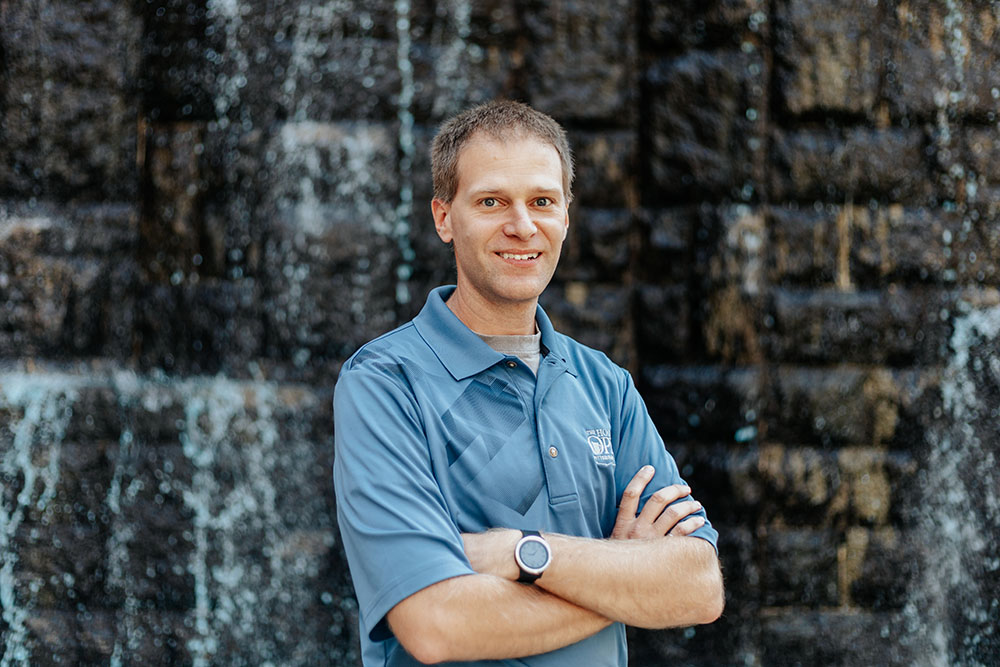Faculty Q&A: Ryan Hoover, Ph.D., Assistant Professor of Mechanical Engineering

Photo by Ethan Stoner '26
After working at Westinghouse Electric Company for over 15 years, Ryan Hoover, Ph.D., P.E. is applying his real-world experience to the classroom as an assistant professor of mechanical engineering in Point Park University's School of Arts & Sciences.
During his time at Westinghouse, Dr. Hoover worked in the areas of control systems design and analysis, setpoint uncertainty, and plant computer systems.
At Point Park, he teaches such courses as dynamics, properties of materials, thermodynamics and introduction to physical and space science.
He is the chair of the International Society of Automation working group responsible for standards on setpoint uncertainty methodologies for nuclear safety-related instrumentation. He also serves on a committee responsible for developing the Fundamentals of Engineering exam.
Learn more about Dr. Hoover's experience and teaching approach in the Q&A below.
What drew you to a career in mechanical engineering?
As a kid, I spent a lot of time playing with different building toys, like Lego bricks. I had a love of building things and seeing how things worked. In high school, I did an engineering apprenticeship that involved touring local engineering companies, and I participated in a national robotics competition. These experiences introduced me to what engineering is and really inspired me to pursue a career where I could foster the love of building that I had from childhood.
Briefly describe your professional experience and what led you to pursue teaching.
I have always been involved in teaching in some capacity. I started with tutoring through college. After college, I gravitated towards tasks at my job that involved training, teaching and coaching. During my time at Westinghouse, I developed training materials for the employee development program and mentored early career engineers. One major turning point in my career was when I had the opportunity to teach as an adjunct professor at another university and absolutely loved it. That was the experience that inspired me to change careers from industry to academia and focus on teaching full-time.
What do you like about teaching at Point Park?
During my professional career, and even as a graduate student, one thing I enjoyed was mentoring younger engineers and students. With the small student-to-faculty ratio, I really get a chance to get to know all of the mechanical engineers in the program and hopefully help them through their experience as well as help them launch successful careers.
What do you want students to know about your teaching approach?
Anyone can learn anything. The challenge is finding some way to relate to the information. I really try to relate new topics or concepts with everyday experiences students have. Particularly with science and engineering, all students have intuitive knowledge of concepts like forces and momentum; they just maybe never thought about exactly how those concepts work.
What are your hobbies and interests?
Music has been a big part of my life starting in grade school. At one point, I wanted to be a band director, so I learned a variety of instruments, including trumpet, tenor sax, alto sax, clarinet, guitar and bass. In high school and college, I focused on playing jazz music. I minored in jazz performance in college, playing in the jazz band at school and around Pittsburgh. I also got a part-time job as an assistant marching band director at a local high school. Nowadays, I play bass in a praise band at my church.
Apart from music, I spend a lot of time with my family, occasionally go golfing and spend my mornings running around the streets of Pittsburgh.
What makes Point Park’s engineering programs distinctive from other universities?
One major differentiator that Point Park’s engineering programs have is the attention students receive from the faculty. I’ve been in classes of over 100 students, and I’ve taught classes of over 100 students. It’s easy to feel lost or to hide in such a large program. Here at Point Park, the small class sizes allow me to get to know each and every student in the program and help them through their college experience.
Learn more about Point Park's engineering programs in the video below:
More About: School of Arts and Sciences, mechanical engineering, Pittsburgh, Downtown Pittsburgh, faculty

